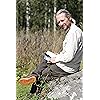Michael
asked:
Why does the author struggle to convey simple scientific information? Also, why does he struggle to get the information technically accurate? Also, why does the author not define his terminology? Also, why does he skim over points requiring scientific examples? Also, why does he lean on subjective ideas rather than using a decent PubMed search? Also, why are a number of his scientific comparisons incorrect?
To answer questions about
The Hidden Life of Trees: What They Feel, How They Communicate: Discoveries from a Secret World,
please sign up.
Diane
Michael, interesting that on your profile, your only favorite quotation is R. K. Rowling's “If you want to know what a man's like, take a good look at how he treats his inferiors, not his equals.” So did writing your snarky "questions" make you feel superior? Hmmm?
You may be a researcher, but my take is that this book's readers are not basic science "lab rats", but instead are a lay audience, who may have never before heard of or considered trees as social beings with senses and awareness and the ability to protect themselves against mobile foes who can cause them harm. I've heard this premise before and find it intriguing, which is why I picked it up to learn more about this fascinating topic. So what if it's anthropomorphic and charming in the telling? If he had gone the direction you suggest, it would not have had the appeal to his lay readers. I’m still reading the book, and am quite interested in continuing. Lighten up.
You may be a researcher, but my take is that this book's readers are not basic science "lab rats", but instead are a lay audience, who may have never before heard of or considered trees as social beings with senses and awareness and the ability to protect themselves against mobile foes who can cause them harm. I've heard this premise before and find it intriguing, which is why I picked it up to learn more about this fascinating topic. So what if it's anthropomorphic and charming in the telling? If he had gone the direction you suggest, it would not have had the appeal to his lay readers. I’m still reading the book, and am quite interested in continuing. Lighten up.
Sneaky Lemur
He has 76references (including ones to "pubmed"". Is Michael commenting on the right book?? Hidden Life of Trees has far more scientific references that I have seen from any American non-fiction author, one of the reasons I found this book so good. Furthermore he works for the forestry industry in Germany, one of the most respected forestry management systems in the world. I didn't perceive his writing style as struggling or as anthropomorphism, but as art. Writing is art. Cool humans art all the time. If some of you guys are afraid of this book, wait until you read "The Secret Life of Plants" by Peter Tompkins!
Jamie
First of all, the author is a forest manager, not a research scientist. Second of all, this book is for a lay audience, not an academic one. Third of all, it's in translation. Given all this, he does a good job explaining the "science" behind the trees he loves dearly. We all have our opinions, but I think he does a service to present the lives of trees to a general reader in this way.
MoreBooksThanTime
I think Michael asks some good questions. Everyone is entitled to their own opinion (including you) - that's what GoodReads is all about. To accuse someone of being snarky is a little like the pot calling the kettle black here. And to take a poke at someone's profile is a low blow. I do, however, think your advice is good: "lighten up."
Clare Snow
Because the author is writing psuedo-science and anthropomorphism has no place in science writing, for any audience. Trees are trees, not people.
A big problem with the book is Wohlleben's incorrect assumption that correlation leads to causation. Just because X happened, doesn't mean Y caused X. It's a common misconception among people without a background in research. Two completely unrelated things might have caused X and Y.
A big problem with the book is Wohlleben's incorrect assumption that correlation leads to causation. Just because X happened, doesn't mean Y caused X. It's a common misconception among people without a background in research. Two completely unrelated things might have caused X and Y.
Lesley Woodhead
Hi Michael,
I'm with you, Michael, and we seem to be in the minority as far as the reviews on this page are concerned. I don't think your questions are snarky but relevant. Many of the other reviewers seem to be happy to assume that because Wohlleben worked for the German equivalent of the Forestry Commission he has the authority to make what seem to me to be unsubstantiated claims about trees.
I'm with you, Michael, and we seem to be in the minority as far as the reviews on this page are concerned. I don't think your questions are snarky but relevant. Many of the other reviewers seem to be happy to assume that because Wohlleben worked for the German equivalent of the Forestry Commission he has the authority to make what seem to me to be unsubstantiated claims about trees.
Sharon Bakar
Plenty of science for this lay reader! Truly impressed with the book. Also with the way he makes a complex subject accessible and fascinating.
Suggest if you want more data that you go read the actual studies he references.
Suggest if you want more data that you go read the actual studies he references.
MJ
Why is this apple not an orange?
William Thomas
Is scientific formalism the only valid lens through which to view and comment on the world around us?
Tich Richardson
Not really sure I would get through a book based on clippings from hundreds of scientific papers. Not even sure that PubMed would actually help considering he's discussing trees and PubMed is principally a bibliographic database on human medical conditions - it does claim to be biomedical, but a more multidisciplinary database like Google Scholar may be more useful.
This is more a David Attenborough book to hook your interest. I'm reading it because it was mentioned in Wilding which is also written in a similar vein. Hope you get more from Google Scholar...
This is more a David Attenborough book to hook your interest. I'm reading it because it was mentioned in Wilding which is also written in a similar vein. Hope you get more from Google Scholar...
Benno Hansen
Why is this question not a question?
Gcardoso
Com todas estas perguntas acho que não percebeste a essência do livro. Talvez estejas a ler muitos livros ao mesmo tempo ou a ler este demasiado depressa. Se quiseres as respostas às perguntas que fazes, sugiro-te que o voltes a ler mas desta vez mais devagarinho.
Alvin
Yep, it's seething with anthropomorphism. Infantile misunderstanding of how evolution works. The reason trees do xx ...blah blah blah. More propaganda than informative.
The Wretched of the Earth
This answer contains spoilers…
(view spoiler)
About Goodreads Q&A
Ask and answer questions about books!
You can pose questions to the Goodreads community with Reader Q&A, or ask your favorite author a question with Ask the Author.
See Featured Authors Answering Questions
Learn more
















